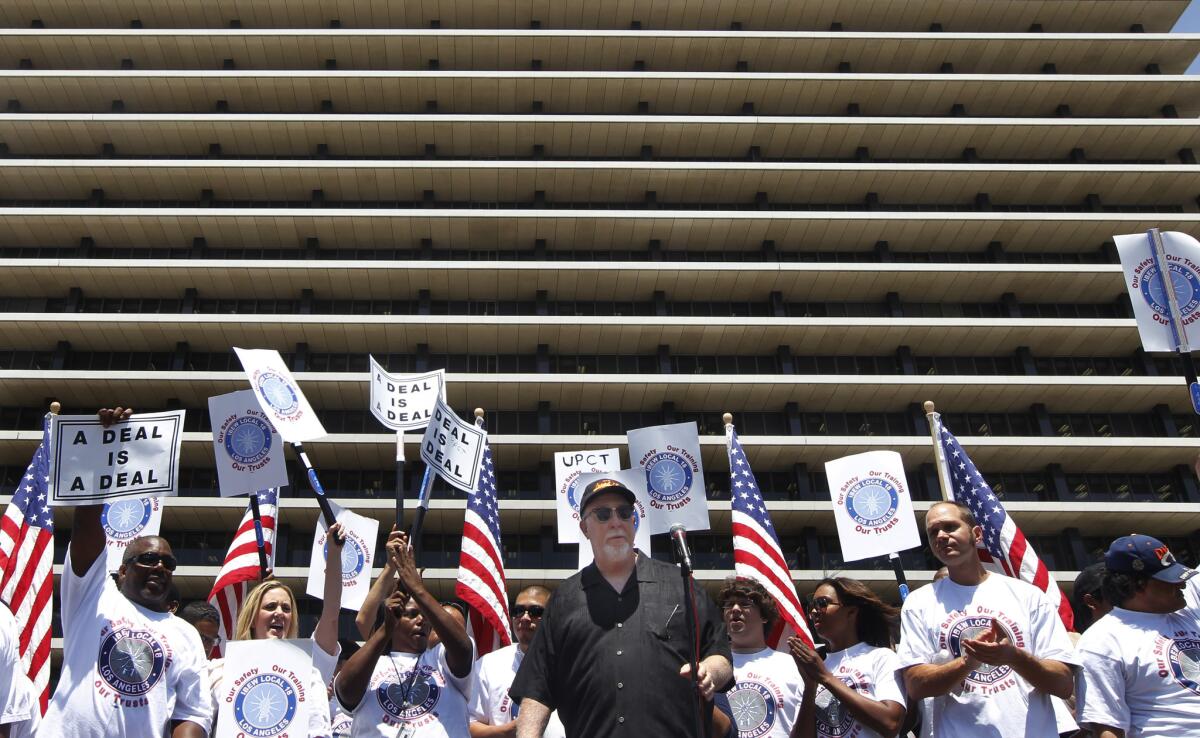Lack of cooperation halts audit of DWP trusts, city says

- Share via
An audit heralded last year by L.A. city leaders as a breakthrough in efforts to determine what two controversial Department of Water and Power nonprofit trusts did with tens of millions of ratepayer dollars has ground to a halt, The Times has learned.
After a long, bitter battle with the DWP’s main employee union over access to the trusts’ financial records, Mayor Eric Garcetti and the City Council announced in November that they’d struck a deal to give city auditors “unfettered access” to the records.
At issue is how more than $40 million in public money funneled to the groups, jointly controlled by DWP executives and the union, has been used — and whether a new round of nearly $4 million in funding will be provided to the nonprofits.
But in late December, less than two weeks into the audit process, Controller Ron Galperin’s office ceased work, citing a lack of cooperation from leaders of the nonprofits, according to City Hall sources. No progress has been made on the audit since, as behind-the-scenes talks to resolve the impasse have continued, according to the sources, who requested anonymity discussing what they said was a highly sensitive matter.
Galperin acknowledged “there have been delays in the trusts giving us access to the information we’ve requested.” But he said he is hoping for “a speedy resolution so we can get this audit done.”
Asked about the delay, Garcetti spokesman Jeff Millman reiterated the administration’s general position. “These audits are important to bring transparency to these trusts and accountability for ratepayers,” he said.
DWP union leader Brian D’Arcy, who has repeatedly thwarted City Hall attempts to perform a thorough review of the spending records, did not respond to a request for comment.
Details of what caused the standoff weren’t immediately available. But the lack of progress raised the possibility that last year’s deal could unravel and the long-running legal and political clash over the nonprofits could resume.
The groups became a thorny political issue for the mayor and City Council in September 2013, after The Times reported that officials at the city-owned utility had scant information on how the trusts had been spending ratepayer money transferred to the groups each year for more than a decade.
The entities — the Joint Training Institute and the Joint Safety Institute — were created following a difficult round of DWP job cuts. The stated mission of the groups was to improve safety and management-labor relations at the nation’s largest municipal water and power agency. Union officials and some city analysts have said the groups conducted safety programs. But there has been no detailed, public accounting of the nonprofits’ expenditures.
At a City Council committee hearing in 2013, lawmakers asked then-DWP General Manager Ron Nichols to list the nonprofits’ biggest achievements. Despite serving on the groups’ boards for years, he said he couldn’t immediately think of any. He also noted the nonprofits’ combined yearly budget of about $4 million is dwarfed by more than $117 million the DWP spends annually on safety programs.
Union leaders have argued the trusts aren’t government entities, so they are not subject to public records laws or the auditing authority of the city controller.
D’Arcy has played a direct role in running the nonprofits, and the president of his chapter of the International Brotherhood of Electrical Workers was paid more than $170,000 in salary by the trusts in 2012, records show.
D’Arcy sued last year to quash a city subpoena demanding five years of detailed financial records, as well as sworn testimony from D’Arcy and other trust officials.
A Superior Court judge sided with the city, ruling the public has a right to know how its money is used. The union was given 10 days to produce the requested records, but D’Arcy filed an appeal, which halted the process. That case is still pending.
Subsequently, Galperin, whose responsibilities include issuing city checks, refused to send the 2014 payment — $3.8 million —to the nonprofits, as called for in IBEW labor pacts. Galperin said he would withhold funds until the union agreed to open the nonprofits’ books.
D’Arcy warned that failing to make the payments would constitute a violation of the union’s contract. And at a large rally held outside the DWP’s downtown headquarters, he told union members and the media that city leaders were asking for “trouble” if they didn’t send the checks.
With the political stakes rising last fall, City Council members brokered a compromise that the mayor praised as a means to finally settle questions about whether ratepayer money was properly spent.
As part of the settlement, the city agreed to set aside lawsuits that sought to place key Garcetti allies on the nonprofit boards — a move that could help speed access to the financial records. In return, the union agreed to drop claims that the city violated its labor agreement.
In addition, Galperin’s auditors were to be given full access to five years of the nonprofits’ financial records for a period of 120 days. If his office found no improper activity in that time, Galperin was to release the annual payment to the nonprofits, and the matter would be closed.
But city officials stressed that if the controller’s audit was impeded in any way, Galperin could refuse to disburse the money to the nonprofits, and the two sides could head back to court.
More to Read
Sign up for Essential California
The most important California stories and recommendations in your inbox every morning.
You may occasionally receive promotional content from the Los Angeles Times.











